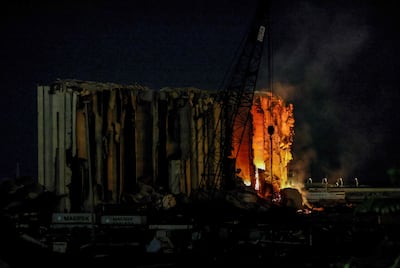The health of millions of people in Lebanon — especially children — is at risk because of a limited supply of safe water, Unicef has warned.
The water crisis, which is largely because of a severe lack of electricity, is also affecting hospitals, health centres and schools.
In a report, Unicef said Lebanon's water supply systems “remain on the brink", with prospects for a solution looking bleak, as limited power supplies make it impossible to pump enough water.
In some cases, pumping operations have shut down entirely, it said.
A devastating economic collapse that first became apparent in 2019 has plunged much of Lebanon into poverty, with the local currency losing more than 90 per cent of its value. As well as water and electricity, there are widespread shortages in medicine and other basic supplies.
The blast that struck Beirut's port in 2020, killing more than 200 people, and Covid-19 have exacerbated that crisis.
“One year ago, Unicef warned that the water system was at breaking point,” said Edouard Beigbeder, the organisation's representative in Lebanon.
“While a total collapse of public water supply networks has so far been averted, the crisis has not been resolved and millions of people are affected by the limited availability of clean and safe water. Addressing the issue is of utmost importance for the health of children and families in Lebanon.”
The output from state providers has plummeted, mainly due energy shortages, but also because they cannot afford diesel, parts and repairs.
Many are forced to rely on water trucks and private providers, but prices have risen sharply while wages have not caught up with the rampant inflation.

"Inadequate supplies of safe water pose a huge risk to infants and young children, who are particularly vulnerable to water and sanitation-related diseases, one of the leading causes of death for children under 5," Unicef said.
"Families are affected both by insufficient supplies of water and prices many can’t afford. Since the beginning of the crisis, per-capita water supplies from the Water Establishments have decreased dramatically amid frequent blackouts, falling short of the 35 litres a day considered to be the minimum acceptable quantity."
With a poor quality of tap water, people in Lebanon drink bottled water. In April, prices were three to five times the cost from the previous year. Unicef says a family of five drinking two litres a day would spend the equivalent of $261 a year.
In Lebanon's Water Establishments, about 40 per cent of its produce “is lost to illegal tapping and leakage, while many of the skilled staff are leaving their positions, often to seek better opportunities abroad”, Unicef said.
“Soaring prices of chlorine, equipment and materials needed for maintenance and repair, coupled with the global supply chain crisis, add to the formidable challenges faced by the water sector in Lebanon.”
Water a 'fundamental right'
Ultimately, Unicef said, the immediate priority needed to be a resolution of Lebanon's power crisis.
"This needs to be accompanied by a continuation of the essential repair and maintenance programme, which will keep the facilities operational to the extent possible," it said.
"With the continued deterioration of the Water Establishments infrastructure, the repair and maintenance programme will need to be extended to cover more major rehabilitation of non-functional equipment."
State electricity is limited to only a couple of hours a day, if that, forcing those who can afford it to turn to expensive private generators.
“Access to water is not only a basic need, it is a fundamental right,” Mr Beigbeder said. "Having sufficient, affordable and safe water saves lives and keeps children healthy."


